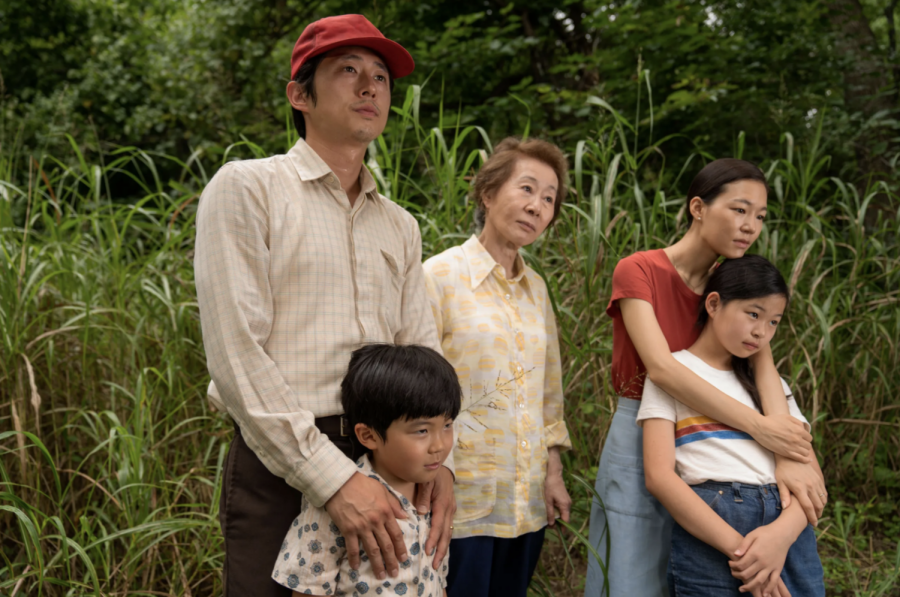Semi-autobiographical film ‘Minari’ highlights real-life struggles of Asian American families in the United States
Josh Ethan Johnson, photographer on ‘Minari’ film crew
Youn Yuh-jung stares into the distance with her family on either side.
After years apart, Monica Yi’s mother, Soon-ja, is traveling from South Korea to Arkansas. Monica rushes through the family’s new cramped house in a mix of anxiety and excitement, making final attempts to clean the kitchen and straighten her children’s clothes. When Soon-jah finally arrives, Monica seems to soften from her usually controlled demeanor. As Monica embraces her mother, her carefully reserved expression breaks, revealing an intense confliction of relief and happiness mixed with concern.
Soon, the two women sit together, opening Soon-ja’s luggage. The suitcases reveal bags of red powder, packets of seeds, and more spices that Soon-ja brought from South Korea. Upon seeing bags of chili powder and anchovies, Monica breaks down in tears, seemingly overwhelmed by the sensory reminder of a home she has left behind.
One of the many things Soon-ja brought with her was Minari seeds, hoping to grow the lefty Korean herb in America. Soon after planting the seeds near a shallow, sandy stream on the family’s small plot of land, the plants begin to sprout. If the Minari seeds can travel over the Pacific Ocean and flourish in a creak in Arkansas, Maybe the Yi family can put down their roots as well.
“Minari,” released in February on Amazon Prime, Google Play and YouTube, follows the story of a Korean American family attempting to build a new home for themselves in an isolated farm in rural Arkansas after moving from a community in urban California. The film explores cultural identity, family relationships and the idea of the “American Dream.”
The film’s release aligned with the increase of anti-Asian violence in the United States, and the corresponding growth of the “Stop Asian Hate” movement. During this difficult time, “Minari’s” depiction of the details and hardships of one Asian American family’s story amplified the unjust struggle families with similar stories have had to go through.
The cast of “Minari” have been strong advocates for the “Stop Asian Hate” movement. Youn Yuh-jung, who played the grandmother in “Minari,” has spoken out about her experience in America and her fear of racially motivated violence. Youn Yuh-jung’s son, who lives in America, advised her not to travel for the awards because he feared she would be attacked. Youn Yuh-jung’s outspoken concern and anger over Asian racism in America resonated with many Americans that share her fear.
Beyond the significance of “Minari’s” content, the film’s reception also made a cultural impact, increasing the representation of Asians and Asian Americans in film. “Minari” was nominated for several awards, including six Oscars. Youn Yuh-jung won in the Best Supporting Actress category, making her the first Korean actor to win an Oscar and the first Korean woman to be nominated.
While “Minari’s” acclaim broke barriers, the awards season was turbulent for the film and its cast. “Minari” was classified as a foreign film in the Golden Globes, making the movie ineligible for the best picture category. The Golden Globes classifies any movie with a script that contains less than 50% English as foreign, yet this requirement has been waived in the past for movies like “Inglourious Basterds,” which is over 50% German and French. This selective inclusion led many people to accuse the Hollywood Foreign Press of showing favoritism.
Minari’s exclusion opened a discussion about why language designates whether a film is “American” enough. ”Minari” is a story about an American immigrant family chasing the American dream with an American director, an American lead actor, and American producers. Many of the film’s advocates argue that “Minari” was the most “American” movie this year.
Despite the controversies, “Minari” serves as a master class in subtlety, and questions the necessity of intense dramatic styles. The production doesn’t attempt to evoke emotion in viewers but rather encourages observation. The film’s empathy and captivation rely solely on the depth of the story and the complexity of characters.
The premise of the film is relatively straightforward. The Yi family moves to a trailer house on a small plot of land in Arkansas where the father, Jacob, begins a farm of Korean fruits and vegetables. The mother, Monica, is unhappy and eventually, Jacob and Monica agree to have Monica’s mother come from South Korea live with them in Arkansas. The rest of the movie follows the father’s struggle with his farm, the grandmother trying to connect with her grandson, the family trying to acclimate to their new home, and Jacob and Monica trying to navigate their relationship.
As the story develops, a combination of brilliant writing and thoughtful acting flesh out the thoughts and motivations of the characters as they live through an exaggerated but familiar story. Every viewer will see something in “Minari” that speaks to them. The beautiful depiction of family, identity, America, and human perseverance makes “Minari” a powerful, empathetic film.



























































